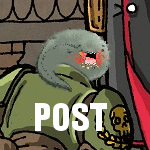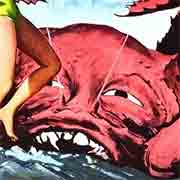Phanatic posted:Still better than agriculture. In terms of quality of life I believe there is literature demonstrating that on a number of measures, first generation industrial workers in Britain were worse off than their subsistence farming agricultural working ancestors (don't want to be an industrial worker at all 1800-1840). Disinterested fucked around with this message at 21:58 on May 26, 2015 |
|
|
|
|

|
| # ? Jun 5, 2024 18:17 |
|
JaucheCharly posted:You've never been to the Rüstkammer, yes? There, the most powerful man of all time had his armor parked
|
|
|
Phanatic posted:Still better than agriculture. The worst bit is that it's not even clear if industrial workers traded agriculture for industry for any more money, either - wage data is pretty hard to read on that. Also, you have to remember people didn't necessarily choose to urbanise, a lot of them were forced. One older journal article: quote:It is therefore not surprising that during the course of the eighteenth century, and until the 1840's, real wages in London followed roughly the movement of real wages in cities as far apart as Paris, Leipzig and Berlin. Wages fell during the second half of the eighteenth century, increasing after the Napoleonic Wars when prices, of bread especially, were falling. By the 1820's wages had exceeded the level of 1790, but not until the 1840s or later did they exceed the level of the 1740's. http://www.jstor.org/stable/2596642 See also Floud et al – Health Height and History: Nutritional Standards, 1750-1980 http://www.nber.org/chapters/c7429.pdf quote:Wrigley and Schofield showed that the crude mortality rate for the population as a whole fluctuated sharply during the first half of the eighteenth century (though less sharply than in the preceding centuries), before falling between circa 1780 and 1830. However, the aggregate mortality rate leveled off during the middle years of the nineteenth century and only resumed its downward path during the 1870s even on an optimistic view: quote:Woods found that life expectancy improved in both urban and rural areas from the early nineteenth century onward, but that the improvement in life expectancy in the most populous areas was much more marked after 1860 (Woods 1985, 650). quote:At the same time, the fact that mortality rates continued to decline within urban areas suggests that even though urban areas were less healthy than rural areas, there was no absolute decline in the living standards of those who already lived in these areas. The main reason for the arrest of progress in the decline of mortality was not a deterioration in the living standards of those who lived in towns, but the disproportionate increase in the size of the urban population. quote:The results of Floud et a1.k analysis of the military recruiting data are shown in figure 3.4. These graphs suggest that the average heights of successive birth cohorts of British males increased between the 1740s and 1760s and fell back between the 1760s and the 1780s. The average heights of successive birth cohorts also increased between the late 1780s and the 1820s and declined between the 1820s and 1840s. The average heights of successive birth cohorts of British men only began to increase consistently from the 1840s onward (fig. 3.4). In other words, a generation of people at least had to be thrown on the fire to get increased living standards. Disinterested fucked around with this message at 22:21 on May 26, 2015 |
|
|
|
|
I used the economic & social history part of my degree for once.
|
|
|
|
|
Disinterested posted:social history Disinterested... DISINTERESTED! kinship diagrams 
|
|
|
HEY GAL posted:Disinterested... You will never convert me from intellectual history. Neverrrrrrrrrrrr
|
|
|
|
|
HEY GAL posted:Haha nope. I've read a little about what bewbies was talking about and average height for London plunges sharply downward as the Industrial Revolution kicks off, only heading up again in the 1840s. This is worse than grubbing in some peasant farm, a lot worse. And yet in every society that industrializes people flee the farms for the cities as soon as they possibly can.
|
|
|
Phanatic posted:And yet in every society that industrializes people flee the farms for the cities as soon as they possibly can. I'd like to tell you about this thing called enclosure.
|
|
|
|
|
Phanatic posted:And yet in every society that industrializes people flee the farms for the cities as soon as they possibly can. I was under the impression that this was due to land reform pushing for higher yields over supporting greater populations of peasents.
|
|
|
|
Rodrigo Diaz posted:The best books on weapons are without a doubt Ewart Oakeshott's but it sounds like you want more than a sword typology and are instead interested in tactics. To that end, Osprey books can be (emphasis on can) pretty good As an introduction. How deep do you want to go down the rabbit hole? T___A fucked around with this message at 23:55 on May 26, 2015 |
|
|
|
The problem with these studies is that they don't actually tell you what would have happened to all those people had they stayed in the rural areas. They suggest that people would have been better off but in reality maybe the increased rural populations would have led to higher mortality rates and poorer health due to overtaxing the local systems? People are pretty good about responding to pressure and there was enough pressure to get vast hordes of them to move to the cities at the drop of a hat.
|
|
|
Murgos posted:The problem with these studies is that they don't actually tell you what would have happened to all those people had they stayed in the rural areas. They suggest that people would have been better off but in reality maybe the increased rural populations would have led to higher mortality rates and poorer health due to overtaxing the local systems? People are pretty good about responding to pressure and there was enough pressure to get vast hordes of them to move to the cities at the drop of a hat. There is a data problem. But the thing is the type of 'pressure' you're talking about isn't purely voluntary. If fields are being enclosed and farmed more efficiently - and later, mechanised - the poorest and least well educated people are essentially being forced to look for work elsewhere to survive. I'm sure they may have done worse in the country on the grounds simply that there were not jobs available for them all. But people are not comparing staying in the countryside in 1820 with working in a city workshop in 1820, they are comparing working in a field before the paradigm shifted away from agriculture to industrial capitalism. In Scotland and Ireland a lot of these agricultural workers are just being forced to gently caress off to America. The point is not so much about choice, as much as it is about how a certain model of living effects a group of people undergoing a societal transformation. It is very clear that the situation of a worker in an urban centre in early-stage capitalism before regulation etc. was not good for people on almost any measure. On the other hand, it also lets you get to a place later down the line where living standards are better in a lot of ways, once better urban planning, regulation, higher wages etc. kick in. Don't forget what people were writing anecdotally in this time - total horror at the living conditions of people working in industrial city work. You just can't make simple generalisations about how it was so much better like people used to back in the day, either way. Disinterested fucked around with this message at 00:16 on May 27, 2015 |
|
|
|
|
JaucheCharly posted:It's a misconception that professional warrior were small. The armor of these guys is large, they were beasts. http://terminallance.com/2010/01/26/terminal-lance-7-good-reasons-to-not-go-to-the-gym/
|
|
|
|
Disinterested posted:I used the economic & social history part of my degree for once. No amount of fancy-pants arguments and eloquence can ever sufficiently substitute for being able to calculate a three year moving average in Excel. Science. 
|
|
|
|
Phanatic posted:Still better than agriculture. Oh God no it ain't. Phanatic posted:And yet in every society that industrializes people flee the farms for the cities as soon as they possibly can. I'm in no way trying to mock you, but it's almost like human beings don't behave like perfectly logical machines or something.
|
|
|
|
Baconroll posted:It also show film of the execution of German war criminals which was odd just in the method used - With a belt around the chest they were hauled up a post, then had a noose attached around their neck at the top, then lowered so they'd strangle to death over a period of 10 minutes. About that... quote:When in autumn of 1944 military executions by hanging were scheduled in France, the Army looked for a volunteer enlisted hangman and found Woods, who falsely claimed previous experience as assistant hangman in two cases in Texas and two in Oklahoma – there is no evidence that the Army made any attempt to verify Woods' claims. In fact, Woods had no documented prewar experience as a hangman.
|
|
|
|
What's more hosed up - to not check, or to volunteer for that duty with no experience because you obviously want it? Also, family members of mine being war people WW2:  WW1:  old family photos own Disinterested fucked around with this message at 02:09 on May 27, 2015 |
|
|
|
|
Disinterested posted:What's more hosed up - to not check, or to volunteer for that duty with no experience because you obviously want it.
|
|
|
HEY GAL posted:What in the life experience of these guys would have made them think that was something they'd need to check up on? I suppose there was no good way to check anyway.
|
|
|
|
|
Disinterested posted:What's more hosed up - to not check, or to volunteer for that duty with no experience because you obviously want it? Given the time frame Wikipedia gives for his volunteering I wouldn't be all that surprised if he just wanted a ticket out of the front lines.
|
|
|
|
ALL-PRO SEXMAN posted:Oh calm down. Pointing out that victory in 1945 wouldn't have happened without American industrial output is hardly minimizing the Russian war dead. Most Soviet rolling stock and trucks were Lend-Lease, after all. Without those, it takes Stalin's armies much longer to advance west. I misread armies as animes. Boy are my posts red.
|
|
|
|
Phanatic posted:And yet in every society that industrializes people flee the farms for the cities as soon as they possibly can. lol And the price of crops crashes too, but that's probably because people just aren't, like, that "into" crops anymore
|
|
|
|
How far would a roman legion get if they were transported into the present day, assuming that the army wasn't immediately called on them and they just had to deal with local police forces?
|
|
|
|
Pistol > gladius. Hope this helps.
|
|
|
|
Taiping Tianguo Part 1 Part 2 Part 3 Seven Brothers As we come closer to war, it's time to take a look at the key leaders within the God Worshippers' camp. Jesus Christ-duh.  Hong Xiuquan- You know this guy. While he remains supreme leader, he gradually becomes more figurehead than executive.  Feng Yunshan- You know this guy too. An extemely talented organizer and inspiring leader, the society's achievements to date are largely his. However, there is a significant period of time where Feng is imprisoned and Hong is away seeking Feng's release, and new leaders emerge.  Yang Xiuqing(杨秀清)- Imagine an ominous minor chord just played. Yang Xiuqing comes from lowly circumstances and illiteracy. He is nevertheless highly intelligent, a skilled leader, and a talented military commander. Before joining the society, he had become a leader to other farmers and workers in the area, and brought his entire clan over to the society. Beyond his talents, however, he is very, very ambitious. In the early days of the movement this may be an asset, but down the road- well, we'll get to that.  Xiao Chaogui(萧朝贵)- Related to Yang by marriage, Xiao is also from poor circumstance, but had become leader to the local mountaineers. His military talents are enhanced by a reputation for personal bravery and, we are told, being swole as gently caress.  Wei Changhui(韦昌辉)- Coming from a wealthy local family, Wei posessed both education and military training. Despite the family's wealth, their partial Zhuang (an aboriginal, non Han ethnic group) blood made them socially inferior to other clans. This boiled into open conflict when Wei tried to purchase a title for his father and the local gentry intervened to gently caress the Weis over. Turning to the God Worshippers, who had a reputation as the people who could help when no one else could, Wei brought with him both his clan and their considerable fortune.  Shi Dakai (石达开)- Only a teenager, Shi already had a reputation as a great prodigy. His talents for scholarship were to be matched by his military talents. Part Zhuang, his language skills would also prove useful. Shi led his clan (and their considerable wealth) to the society for protection following yet another ethnic conflict with non-Hakka. Shi would impress both friend and foe alike over the course of the war with his military talent and fair administration, and usually comes across as the most sympathetic figure of the rebellion to a modern audience as well. There are many others with wealth or military experience who join the society at this time and will later assume leadership roles, but these four are preeminent. Visitations from Above Things get weird while Hong and Feng are away in 1848. Yang begins to fall into a trance like state and speak with the voice of the Heavenly Father. Xiao similarly finds himself possessed by the Heavenly Elder Brother. While really weird to most Christians, the idea is a little less goofy in a Chinese cultural context, where spirit possession and mediums are widespread and part of centuries old traditions. It's obviously impossible to identify the authenticity of these messages and whether Yang and Xiao sincerely believed themselves to be channeling spirits. Considering how often Yang's messages involve giving Yang more power, it is easy to guess. Xiao's are not self serving, but it isn't hard to imagine how framing proposals as literal messages from God is an easy way to ensure acceptance among the diverse groups that have banded at Thistle Mountain. In some cases, like when Jesus (through Xiao) rebuked Hong for foolishly risking his safety after almost being captured by bandits, it may have been a way to say what needs saying in a politically safe way. Many others in the camp in this period claim visions and divine messages. When Hong returns, he accepts the authenticity of Yang and Xiao's messages, but no one else is allowed to speak for God or Jesus. Context for these strange episodes may come from considering the biblical sources of Taiping belief. The old testament is absolutely full of God straight up telling his chosen people what to do. Similarly, since Jesus is on record as returning after death to preach for another 40 days, there would seem no reason to assume he wouldn't also come back to give his little brother a hand. Just as we can't know whether Yang or Xiao believed themselves to be receiving divine messages, we can't know whether Hong privately believed them or if he accepted the authenticity of the messages out of political expedience to maintain harmony in the society and bolster the faith of his followers. That said, given Hong's intense faith, I suspect he would have either been naive enough to accept the visitations, bold enough to condemn them if he thought them false, but not devious enough to exploit blasphemy for his own purposes. The fact that he subsequently gave these two men major leadership positions argues for Hong's willing suspension of disbelief. Forging an Army The contribution of Wei to the movement is less spiritual and more direct. His clan has a large barn that is used to start building an arsenal. As wealthy merchants, they buy up iron without suspicion. With this iron and charcoal from the mountain, weapons are produced at a furious pace. A huge flock of geese are kept by the barn, and their incessant honking conceals the noise of production. When complete, the weapons are sunk and hidden in a nearby pond (I have no idea what they did for waterproofing). Curious recruits wondering where their weapons came from would simply be told that the Lord provides. Before mobilizing, the society has already devised a system of military organization. It is based on ancient texts from the Zhou dynasty, back when China worshipped Shangdi. 4 men plus a corporal form a squad, 5 squads plus a lieutenant form a platoon, 4 platoons and a captain form a company, 5 companies led by a brigadier general form a brigade, 5 brigades are lead by a division commander, and five divisions constitute a full army of 13,155 men. Strict discipline is also introduced. Regulations prohibit theft, lying, drunkenness, gambling, and opium (many bandits and pirates who had joined the society decide to get out). Plundering will be right out, as any captured valuables are to be turned over to the "sacred treasury" where all property is held in common. This is part religious conception of universal brotherhood, part military expedient to ensure discipline. Attendance at religious services is required. And The Taiping, in their wandering stage, will practice strict segregation of the sexes. Men and women can only see each other for brief chaperoned visits. This comes in part from interpreting the commandment against adultery so strictly that you can't even bone your own wife. More immediately, it is a practical approach for what is, for a considerable period, going to be an army on the march instead of a civil society. With the women organized in their own military structure mirroring the organization of the men, their men will be able to fight without worrying if their families are provided for. If a man dies in battle, their families will still be cared for as before, a more stable situation than that faced by typical camp followers. The women also serve as a deterrent to desertion, as it would be impractical for a deserter to sneak his wife out of the women's camp. The women will serve as a valuable non-combat auxiliary corps, and many women will ascend to powerful administrative and even military positions. Most famous was Su Sanniang, a bandit leader who would become a fervent revolutionary fighting alongside and leading male soldiers. It is worth noting that the Hakka never practiced footbinding (the Taiping would forbid the practice), and their harsh economic circumstances demanded sturdy women who could keep up with the men in the fields. So while the Taiping would have a pretty unhealthy relationship with sex, they would in other respects be much more progressive regarding women's status. The Final Countdown One last bizarre incident occurs as final preparations mount. Yang Xiuqing is struck dumb by a bizarre illness that miraculously cures when Feng steps down and Yang is promoted to second in command. Hong places Xiao third in command, but has also arranged a marriage of Xiao and Hong's sister, tying Xiao directly to Hong. Additional powers are given to several other generals to mitigate the concentration of power in Yang's hands. Hong arranges for his family to be brought to Guangxi. This goes smoothly, except for Hong Rengan, who will be left behind in Guangdong and not reunite with his cousin until far in the future. Conflict with local groups, and persecution by officials like Wang Zuoxin, continue, but the God Worshippers are increasingly powerful enough to provide justice for themselves. Some attempts to call out militia to harass God Worshippers are foiled when more than half the militia are God Worshippers themselves. Finally the call goes out for all society members to converge on Jintian, the town at the base of Thistle Mountain that will become the site of the first battle of the Taiping Rebellion. It will look like this. https://youtu.be/s54-ZMbEuNY?list=PLLac-P2kBBgSxd5ShaoRwZtnz1OnKp6_X&t=3232 Next update will finally have battles in it. Probably won't be ready until next week, unfortunately.
|
|
|
|
SlothfulCobra posted:How far would a roman legion get if they were transported into the present day, assuming that the army wasn't immediately called on them and they just had to deal with local police forces? Haha oh man. Are you writing a reverse Final Countdown?
|
|
|
|
Hypha posted:This is not my area but a very quick literature search suggests that there is a lot of interest in this question from a chronic disease perspective. Namely, that our lifestyles do not match our genome, which leads to pathology. In biology, the term evolution can be used correctly to describe any change in the traits of a population, including behavioral and cultural transitions. For example there are many studies of cultural evolution among songbirds. In some species tunes change as often as top singles on a pop chart.
|
|
|
|
A match-up between a Roman legion and riot police could be kinda interesting - I always thought that riot police had at least some superficial similarities to a legion. 'Course, you'd probably want to arm the police with something other than batons. Also I imagine a water cannon could play merry hell with a melee-based formation.
|
|
|
|
midnightclimax posted:Or maybe they're getting better at timing the doping? What's the basis for you saying fewer athletes use PED now than in the 1970s? Sorry, I dug around and didn't find the study I had in mind, from Baseball Prospectus, using statistical evidence to show that PED use peaked in the 1970s. Wikipedia says that almost all athletes in some sports were juicing in the 1970s, and that 68% of athletes at the 1984 Olympics had used steroids. They lack citations to compare properly to modern sport, and I don't know of any studies except that Baseball Prospectus one with good comparisons between the 1970s and now.
|
|
|
|
Squalid posted:In biology, the term evolution can be used correctly to describe any change in the traits of a population, including behavioral and cultural transitions. For example there are many studies of cultural evolution among songbirds. In some species tunes change as often as top singles on a pop chart. I would agree but the context in this case is related to genetics. The hypothesis that our bodies over the last 1000 years have been evolving to be more sedentary would require significantly more evidence before I buy it. Genetically, we still are closer to our ancestors than not. At best, I feel you have a epigenetic argument to explain the differences between us and our "cave men" ancestors.
|
|
|
|
Hypha posted:I wanna call BS on this claim. There is little I feel to suggest that a sedentary lifestyle has a strong enough selection pressure in that frame of time. Do you have a demonstrated genotype/phenotype that supports this? I found this Gresham College lecture specially interesting about that topic: https://www.youtube.com/watch?v=xBO2d39Tqgg
|
|
|
|
SlothfulCobra posted:How far would a roman legion get if they were transported into the present day, assuming that the army wasn't immediately called on them and they just had to deal with local police forces? Assuming the cops were trying to arrest/kill them, not far. There's a good chance a few rounds to the chest, even if their crude, case-hardened steel segmented armor prevented their penetration (a maybe), would render a legionnaire incapable of fighting due to soft tissue trauma. A round upside their helmet would likely put them in a coma. Their shields would probably be useless. CS gas or pepper spray would probably send them into disarray and stuff like a water cannon would knock them flat on their toned asses. Hell, a few rounds fired into the air might be enough to freak them out.
|
|
|
|
FAUXTON posted:Assuming the cops were trying to arrest/kill them, not far. There's a good chance a few rounds to the chest, even if their crude, case-hardened steel segmented armor prevented their penetration (a maybe), would render a legionnaire incapable of fighting due to soft tissue trauma. Why do we assume the Romans show up and immediately want to fight? Maybe it's a question of how far they'll get in modern academia with their intimate knowledge of Roman military structure, questionable historiography, and fluent command of Latin.
|
|
|
|
Chamale posted:Why do we assume the Romans show up and immediately want to fight? Maybe it's a question of how far they'll get in modern academia with their intimate knowledge of Roman military structure, questionable historiography, and fluent command of Latin. Or their lack of knowledge regarding traffic and electricity. I'm sure at least a couple would become roadkill before they figured it out. There's tons of poo poo we know from kindergarten that we take for granted, like not drinking poison, avoiding radiation/biohazards, or what money looks like. They certainly aren't neanderthals but sometimes it's easy to forget that we exist in a context that is far removed from, say, 10 BC and in a lot of cases they might as well be absent a translator. How do you convey "this fence will electrocute you" to a legionnaire? How about "don't walk in the subway tunnel" or "not everyone is going to notice you on the road and come screeching to a halt?" E: also that's generally what Romans do when they show up.
|
|
|
|
i thought roman traffic sucked bad? they wouldn't understand cars, but they'd probably "get" cities
|
|
|
|
HEY GAL posted:i thought roman traffic sucked bad? they wouldn't understand cars, but they'd probably "get" cities I'm imagining traffic lights and poo poo being an issue for a short time, too.
|
|
|
|
Hypha posted:I would agree but the context in this case is related to genetics. The hypothesis that our bodies over the last 1000 years have been evolving to be more sedentary would require significantly more evidence before I buy it. Genetically, we still are closer to our ancestors than not. At best, I feel you have a epigenetic argument to explain the differences between us and our "cave men" ancestors. Arquinsiel posted:It wasn't actually the sedentary lifestyle so much as the changing attitudes towards violence as a method of resolving conflicts at every level of society that the article was talking about IIRC. I think the idea was that the sedentary lifestyle was a response not only to the ability, via tech, to have one, but also to the lack of a need to patrol your fields to make sure nobody nicked your cows and be able to give them a whomping if you found them trying. No idea where I found the original article though, I really need to start bookmarking everything I come across.
|
|
|
|
FAUXTON posted:Or their lack of knowledge regarding traffic and electricity. I'm sure at least a couple would become roadkill before they figured it out. There's tons of poo poo we know from kindergarten that we take for granted, like not drinking poison, avoiding radiation/biohazards, or what money looks like. They certainly aren't neanderthals but sometimes it's easy to forget that we exist in a context that is far removed from, say, 10 BC and in a lot of cases they might as well be absent a translator. And after surviving the immediate hazards, how do they work and survive? One ancient Roman would be set for life because of classics departments wanting to interview him, but what do you do with 5,000 ancient Romans? Are they citizens of Italy because they were born on Italian soil with parents of unknown citizenship? I think all this makes for a more interesting story than "The Roman Legion That Surrendered To Tear Gas".
|
|
|
|
Chamale posted:And after surviving the immediate hazards, how do they work and survive? One ancient Roman would be set for life because of classics departments wanting to interview him, but what do you do with 5,000 ancient Romans?
|
|
|
|

|
| # ? Jun 5, 2024 18:17 |
|
Chamale posted:And after surviving the immediate hazards, how do they work and survive? One ancient Roman would be set for life because of classics departments wanting to interview him, but what do you do with 5,000 ancient Romans? Are they citizens of Italy because they were born on Italian soil with parents of unknown citizenship? I think all this makes for a more interesting story than "The Roman Legion That Surrendered To Tear Gas". Hopefully you start by vaccinating and quarantining them. Then you find a way to teach them poo poo like "planes aren't birds" and "that wasn't thunder." Basically you're starting with comedy but growing into some neat statecraft poo poo.
|
|
|

































